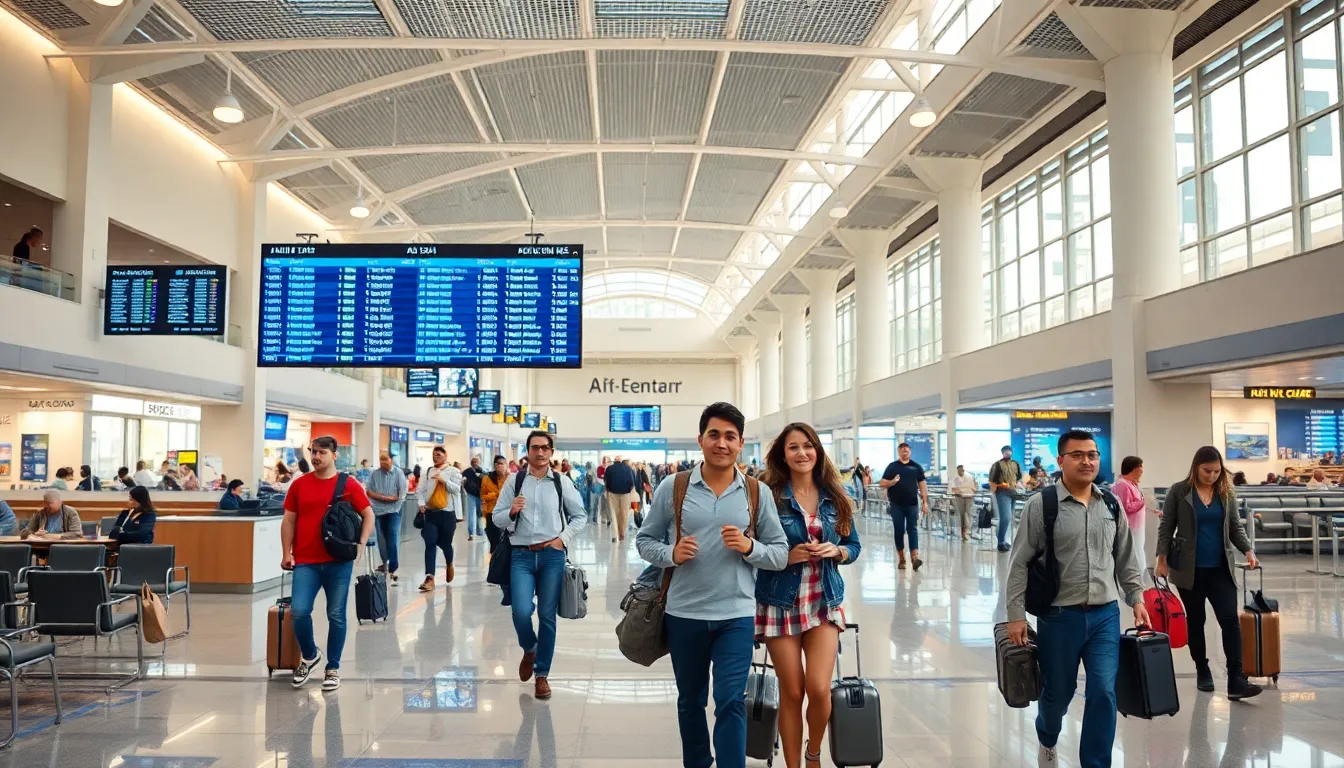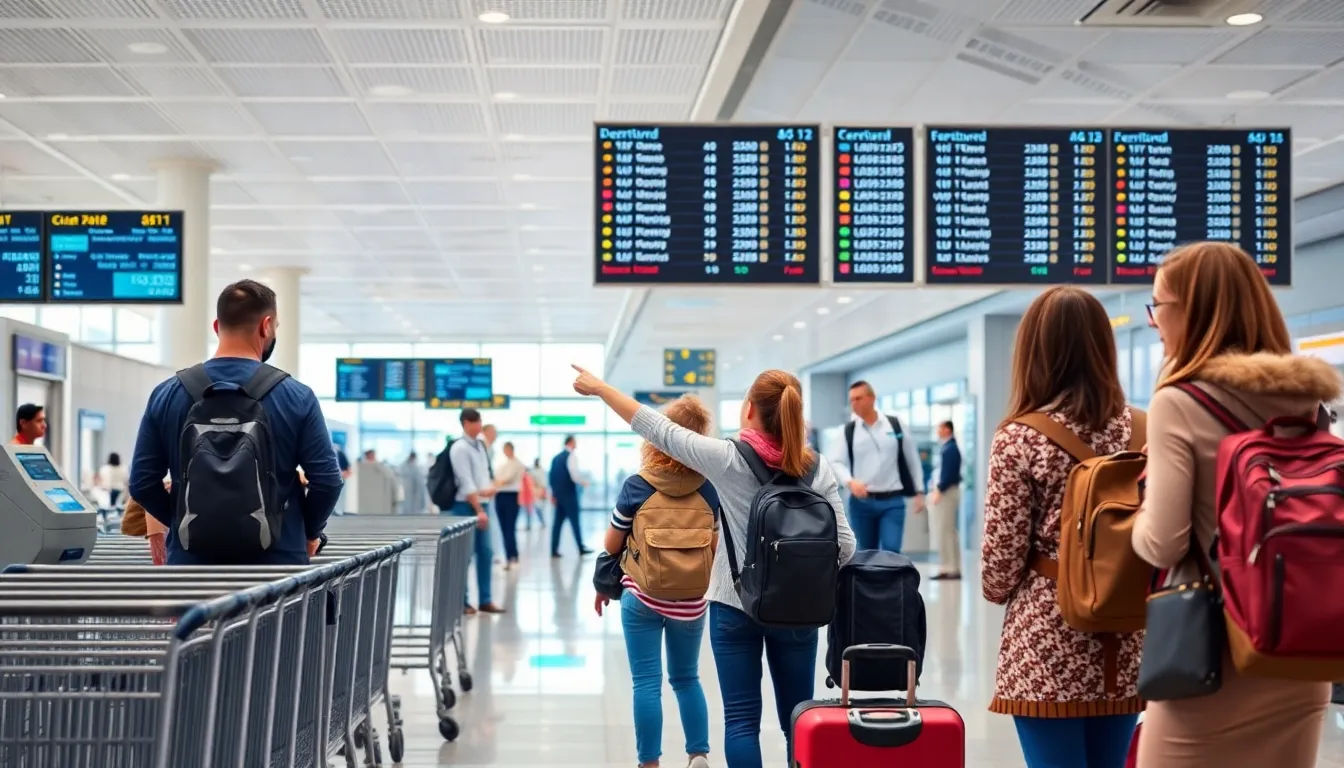Airports are like the world’s busiest stages, where the drama of travel unfolds daily. From unexpected flight delays to the latest in airline innovations, there’s always something happening that could make or break a traveler’s day. Whether it’s the joy of a long-awaited reunion or the chaos of lost luggage, airport news is the gossip column of the skies, and it’s time to tune in.
In a world where every second counts and every delay feels like an eternity, staying updated on airport happenings is crucial. With the latest trends and changes in air travel, passengers can navigate the skies with confidence and maybe even a chuckle. So buckle up, because this article is your boarding pass to all the essential airport news you didn’t know you needed—because who wouldn’t want to be in the know before they take off?
Table of Contents
ToggleLatest Developments in Airport News
Updates about airport procedures often change rapidly. Recent reports indicate an increase in airports adopting biometric technology to enhance security and efficiency. Travelers can expect streamlined check-in processes, reducing wait times significantly. Innovations in baggage handling systems also feature prominently, with automation improving reliability and efficiency.
Airlines are responding to customer demand for sustainable practices. New eco-friendly initiatives are emerging, including the use of sustainable aviation fuel (SAF) and carbon offset programs. Many airlines plan to expand their fleets with more energy-efficient aircraft, contributing to a reduction in carbon emissions.
Safety protocols continue to evolve in light of global health standards. Masks may still be encouraged in high-density areas, although requirements are becoming less stringent. Regular updates from health authorities ensure that protocols align with current health guidelines.
Technological enhancements are prominent among recent airport developments. Airports are investing in advanced communication systems to improve passenger information dissemination. Real-time flight tracking apps have gained popularity, providing travelers with timely updates about their flights and gate changes.
In terms of infrastructure, several major airports are undergoing expansions. Projects aim to accommodate rising passenger numbers and enhance overall travel experiences. New terminals and facilities promise to integrate modern design with functional efficiency, aiming for a seamless journey from check-in to boarding.
All these developments underscore the need for travelers to stay informed. Keeping up with airport news not only aids in navigating logistical changes but also enhances the overall travel experience.
Major Airport Expansions and Renovations

Airport expansions and renovations play a crucial role in accommodating growing passenger demands and enhancing travel experiences. Many airports worldwide are currently undertaking significant projects to upgrade facilities and improve functionality.
Notable Projects Worldwide
Los Angeles International Airport (LAX) is investing $14 billion in a major overhaul that includes a new terminal and enhanced transportation infrastructure. London Heathrow is also expanding, aiming to increase capacity by constructing a third runway at an estimated cost of $14 billion. Meanwhile, Singapore Changi Airport’s expansion features a new terminal and a lifestyle facility, reflecting the airport’s commitment to delivering exceptional services. Airports in India are innovating as well, with Delhi Airport undergoing a $2 billion renovation to improve passenger amenities and streamline operations.
Impact on Travelers
Travelers can expect reduced wait times and improved services due to airport expansions. Enhanced terminal designs prioritize passenger comfort, facilitating smoother navigation through high-traffic areas. Expanded facilities mean more dining and shopping options, enriching the travel experience. Improved transportation links make accessing the airport easier, especially with upgraded public transit services. Ultimately, these developments cultivate a more efficient and enjoyable travel environment, benefiting both leisure and business passengers.
Innovations in Airport Technology
Recent advancements in airport technology transform travel experiences, focusing on efficiency and passenger comfort. Airlines and airports adopt various innovations to streamline procedures and enhance security.
Digital Check-In Systems
Digital check-in systems simplify the check-in process for travelers. Mobile apps allow passengers to check in, choose seats, and access boarding passes on their devices. Self-service kiosks further reduce lines, enabling quick and easy check-ins. With these systems, many airports report decreased wait times, enabling passengers to move through terminals with greater ease. Data suggests that airlines using digital check-in options experience up to a 30% reduction in operational delays. The convenience offered boosts traveler satisfaction and fosters a smoother departure experience.
Biometric Screening Solutions
Biometric screening solutions enhance security and expedite passenger processing. Facial recognition technology identifies travelers quickly, minimizing the need for manual document checks. Airports implementing these systems often report faster security lines, with processing times reduced to seconds. In addition, biometric systems support health protocols by minimizing physical contact between travelers and security personnel. With advancements in accuracy, biometric technology achieves recognition rates exceeding 99%. This innovation not only improves security but also elevates the overall airport experience.
Sustainability Efforts in Airports
Airports increasingly focus on sustainability to minimize their environmental footprint. They adopt various measures to enhance ecological responsibility and promote energy efficiency.
Green Initiatives and Practices
Airports implement sustainable practices, such as utilizing solar panels and rainwater harvesting systems. Energy-efficient lighting and HVAC systems contribute to reduced energy consumption. Waste management programs emphasize recycling and composting, diverting significant landfill waste. Many airports engage in community partnerships to promote local conservation efforts. Electric ground support equipment lowers emissions and noise levels. These initiatives support a shift towards greener operations and offer positive impacts on local ecosystems.
Case Studies of Successful Examples
San Francisco International Airport (SFO) exemplifies sustainability with its impressive zero waste goal. Its programs achieved a diversion rate exceeding 80%. Seattle-Tacoma International Airport (SEA) utilizes a comprehensive energy management system, resulting in energy savings approaching 25%. Denver International Airport (DEN) features a powerful solar array, generating renewable energy to power much of its operations. These successful examples demonstrate effective sustainability efforts that enhance operational efficiency while prioritizing environmental protections.
Airline Partnerships and Collaborations
Airlines are continually forming partnerships and collaborations to adapt to an ever-changing travel landscape.
New Routes and Services
Recent announcements include new international routes that enhance connectivity between major cities. Airlines are expanding their service offerings to meet passenger demand for direct flights. Air France recently launched a non-stop service from Paris to Nashville, giving travelers more convenience. Similarly, Delta Air Lines announced new routes to popular destinations in Europe, such as Barcelona and Rome. By adding these services, airlines aim to increase market share and improve customer satisfaction, providing more options for leisure and business travelers.
Strategic Alliances
Strategic alliances among airlines create a robust network that benefits passengers. Star Alliance recently welcomed a new airline member, enhancing its global reach and cooperation. Members leverage shared resources, making it easier for travelers to book connecting flights and earn loyalty rewards. Oneworld’s recent agreement with several Asian carriers facilitates smoother travel between the US and Asia. Collaborative efforts like code-sharing allow airlines to expand their offerings without additional fleet investment. By forging these relationships, airlines improve operational efficiency and customer experience.
Staying updated on airport news is crucial for modern travelers. With rapid advancements in technology and sustainability initiatives airports are becoming more efficient and passenger-friendly. Innovations like biometric screening and digital check-in are enhancing the travel experience while reducing wait times.
As airlines expand their networks and form strategic partnerships the options for travelers continue to grow. Understanding these changes not only prepares passengers for their journeys but also allows them to enjoy the benefits of a more connected and environmentally conscious travel landscape. Keeping informed about airport developments ensures that every trip can be navigated with ease and confidence.





